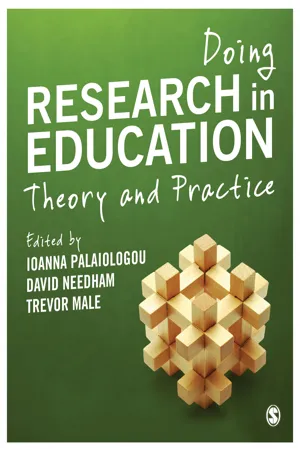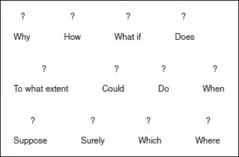Introduction
When you go into an educational setting, do you ever ask questions that help you to find something out? Sometimes conversations with professional people enable you to learn from what they do and may prompt you to ask even more questions so that you explore issues and improve your understanding of some of what you observe. It could be argued that as human beings it is instinctive for us to ask questions, often internally to ourselves, and that research is something that we all do most of the time.
Intuitively, and in different ways or at different levels, we want to discover knowledge, often by prefacing our thoughts with words such as ‘why, how, might, what if, does, could, do, when, where, suppose or even “surely”!’ It was Kagan (1972) who argued that people are motivated to reduce their sense of uncertainty between themselves and their environment. This is simply part of our behaviour. We all have a desire for knowledge which is why we seek explanations. It simply helps us to make sense of the world. The instinct of human beings is to ask questions and then try to answer them by finding the answers. Reading, research and finding things out just makes life so much better!
It is not easy beginning a research project and subsequently writing a report or constructing a dissertation or thesis. This is because in some cases it may take a great deal of time to complete, possibly spanning at least a whole academic year and maybe longer! It is important, therefore, to choose an area that you are genuinely interested in and fascinated by. Perhaps it is clichéd to say that research is something that is very personal, but it is something that you, the researcher, control from the outset. It is your topic and is different to that chosen by anybody else. It is also something that you are going to complete and do differently to the way in which anybody else would carry out their project. It is you, with your very human qualities, who will make your project unique. That makes it very exciting! Through your project you are going to gain an insight into an area of education in a way that enables you to become a specialist within your chosen topic.
Figure 1.1 Prefacing questions
Definition – Thesis or dissertation
A detailed document based upon an element of research submitted in full or part fulfilment of an academic degree or professional qualification.
What is Educational Research?
The starting point for this is to think about the word ‘research’. The picture that often comes into our minds when we think about research is that of scientists in white coats experimenting in a laboratory. We may also think about doing research, however, by exploring the Internet or through reading books and browsing journals in a library. Each of these images contains similar characteristics in that research is something scholarly that involves some form of investigation in order to find something out within a particular discipline such as education (Newby, 2014).
The word research comes from the French word ‘rechercher’ (to travel or survey, or establish facts and relationships). This is not like being in a classroom or a lecture hall where you might listen or take notes. In those instances you are at the receiving end of the educational process. Although these sessions are important in providing you with knowledge and understanding it might not be answering all of your questions or allowing you to test your thoughts. Research is something that involves an investment and enables you to develop new knowledge and understanding (HEFCE, 1999). In this sense it helps you to seek answers to questions (Tuckman and Harper, 2012). Involving yourself in research helps to make your learning active and makes it relevant and exciting. Research is, therefore, a practical process for you. However, let us not forget that research also involves a sense of your own personal reflection in which you ponder and make sense of what you have learnt.
We all have experience of an educational environment. Inevitably, your early experiences within school will have had some part to play in developing your views or ideas about education. The problem with forming views, and we all have them, is that they create unsubstantiated reasoning. There is often little basis upon which to make statements or observations other than through our own experience. This is where educational research comes in. Educational research is about the reorientation of ideas on the basis of information obtained through an investigation. It is a process of discovery through which reading and data help to reduce any sources of error within our reasoning to create a better sense of authority. Think of it as a process of putting contact lenses or spectacles on to help you to see the world more clearly. As you do so you come closer to understanding the real answer to all of your questions. It is through this that with authority and confidence you find out a little bit more about all that is happening within the world of education.
Educational research is something that engages with the practice of education. For example, it could include a focus upon schools, classrooms, learning, teaching, management, policies, and legislation and might cover issues related to sociology, psychology, history, politics, child development, teacher education, culture, gender, economics, art and creativity, life sciences, ethnicity, technology, media, mathematics, language, recreation and human physical or social performance. The list is almost endless. There is also logic about educational research which ensures that the procedures for constructing the project and undertaking the research help to make it a valuable tool for understanding the chosen area. For further guidance on this it is worth referring to the SAGE book Research Methods in Education (Check and Schutt, 2012).
Educational research thus involves an organised and structured process or approach by the researcher – you – to find the answers to a hypothesis or research question or attempt to solve one or more problems, likely to be related to one or more of the areas above, by reading, collecting data and through searching for explanations (Anderson and Arsenault, 1998). In other words, by gathering data from one or more sources and by undertaking a thorough examination of relevant literature the researcher is trying to improve their understanding of the issue upon which they are focused in a way that produces unbiased findings. This involves:
- reading literature and gathering data to use;
- developing new knowledge;
- creating a qualified understanding of issues related to learners and education;
- processes of discovery about issues that really matter to the researcher;
- being careful, rigorous, measured, accurate and precise as the process of research is developed;
- developing an unbiased process that attempts to solve a problem;
- satisfying and informing the interests of the researcher;
- enjoying the journey. Research is not a fixed process, but is iterative and creative. Along the journey you may adapt and refine your approaches and direction.
Researching an educational environment can be unpredictable and messy. It was W.C. Fields, the American comedian, who penned the phrase ‘never work with children or animals’. Your research may take place in early years settings, schools, colleges, universities or other educational organisations; it could involve talking with specialists such as teachers or child psychologists. You may meet members of other related occupations such as carers, parents, police officers or employers. It could involve listening, observing, asking questions, recording and meeting individuals of various ages and from different backgrounds. However, in most instances and, at the heart of many areas of educational research, are children or young and perhaps vulnerable people. Things often go wrong. It can sometimes be difficult to arrange meetings with busy people or observations in educational settings. As research involves dealing with people, there are also many ethical issues which should be at the forefront of any project. It is never easy being a researcher and an ethical code of conduct is really important (this will be discussed more fully in Chapter 3). Educational research takes many different forms and may demand many different approaches. As you undertake the role of a researcher you will want to seek answers and improve your understanding of issues related to your chosen area. You may be trying to find out, for example, whether reading differences in children within a Year 2 classroom depend upon their birth date, whether sex education programmes within a secondary school impact upon teenage pregnancy, how speaking English as a second language impacts upon the experiences of an early years child, whether gender influences outdoor learning or whether role play within a nursery might help children to develop life skills. The list is endless and everybody’s approach to solving their research problem is different. This is what makes educational research so interesting, not just for the researchers, but also for the tutors and supervisors.
Educational research allows you to pursue your interests and to learn something new. It is an academic exercise that enables you to hone your problem-solving skills and to challenge yourself in new ways as part of your own learning. As you do so you work closely with your supervisor who is likely to be an experienced researcher and with whom you should meet regularly. Then as a researcher you seek answers to questions that you are genuinely interested in. Remember that it is you who chooses your approaches and the tools or your research as you read and articulate your ideas while you gather and analyse your data.
Activity
Either on your own or within a group, think about the potential benefits that could arise for teaching and learning from good educational research. Discuss your thoughts with others.

